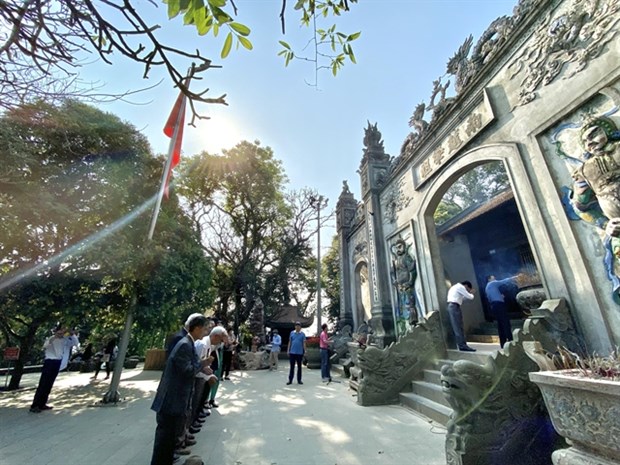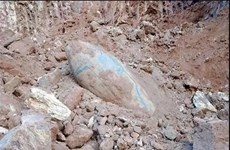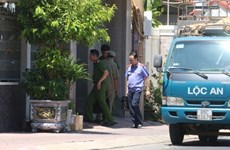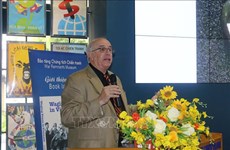Hung Kings’ commemoration in Phu Tho draws crowds
 Visitors offer incense at Den Thuong (the High Temple) (Photo: VNA)
Visitors offer incense at Den Thuong (the High Temple) (Photo: VNA) Hanoi (VNA) – Hundreds of thousands of people visited the Hung Kings Temple Relic Site in the northern province of Phu Tho during the three-day national holiday from April 9-11.
The site reported a major surge in visitors as 200,000 people came to attend the official ceremony on April 10 to pay tribute to the nation's legendary founders.
Director of the site’s management board Le Truong Giang told Tuoi tre (Youth) newspaper: “One hundred percent of the province’s police and 300 youth volunteers and military personnel were mobilised to ensure safety for the ceremony and visitors.
“This morning alone, hundreds of thousands of people have arrived to pay tribute to the Hung Kings.”
President Nguyen Xuan Phuc, Party and State officials, and the province's leaders offered incense and flowers in tribute to the kings the same day.
The site welcomed about 20,000 visitors on April 9, and 10,000 on April 8, according to Giang.
Tribute ceremonies to the kings were also held at various locations across the country, including HCM City, the Central Highlands province of Dak Lak and Lam Dong, and the southern provinces of Kien Giang, Vinh Long, Dong Nai, Can Tho and Ca Mau.
The Vietnamese embassies and Vietnamese communities in Malaysia, Hungary, and France also paid tribute to their homeland’s founders in their respective countries.
The worship of the Hung Kings closely relates to the ancestral worship traditions of most Vietnamese families. It was recognised as part of the Intangible Cultural Heritage of Humanity by UNESCO in 2012.
The worship has its root in a legend, which has it that Lac Long Quan (real name Sung Lam, son of Kinh Duong Vuong and Than Long Nu) married Au Co (the fairy daughter of De Lai). Au Co then went on to give birth to a pouch filled with one hundred eggs, which soon hatched into a hundred sons. However, soon thereafter, Lac Long Quan and Au Co separated. Lac Long Quan went to the coast with 50 of the children, while Au Co went to the highlands with the rest.
Their eldest son was made king, who named the country Van Lang and set up the capital in Phong Chau (modern-day Viet Tri city in Phu Tho province), beginning the 18 generations of the Hung Kings.
The kings chose Nghia Linh Mountain, the highest in the region, to perform rituals devoted to rice and sun deities to pray for healthy crops.
To honour their great contributions, a complex of temples dedicated to them was built on Nghia Linh Mountain, and the 10th day of the third lunar month serves as the national commemorative anniversary for the kings.
During the feudal period, Vietnamese kings set up places of worship dedicated to the Hung Kings and organised grand events to honour the legendary ancestors of the nation.
Upon the success of the revolution, President Ho Chi Minh signed a decree dated February 18, 1946 that allowed public employees to take a day off on the tenth day of the third lunar month so as to attend activities marking the Hung Kings’ Commemoration Day.
President Ho visited Hung Kings Temple twice in 1954 and 1962. He underlined that the legendary ancestors founded the nation and Vietnamese people must together enhance national protection. The President also called for more flowers and trees to be grown at the temple.
In 1995, the Communist Party of Vietnam’s Secretariat recognised the Hung Kings’ Commemoration Day as a major celebration of the year and the Government afterwards issued a resolution and decrees celebrating major events, notably the death anniversary of Hung Kings will be celebrated as a national one on the tenth day of the third lunar month.
On the day, people from all walks of life travel to Hung Kings Temple to pay tribute to the legendary ancestors and predecessors who fought against evaders and protected the country./.













